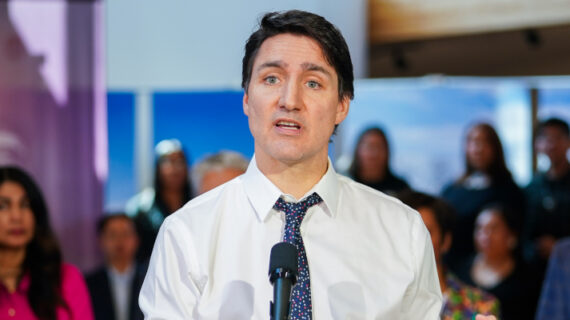On November 22, 2022, as part of the Ontario Chamber of Commerce’s Ontario Economic Summit, The Hub’s executive director Rudyard Griffiths moderated a “Munk-style” debate involving Globe and Mail columnist Andrew Coyne, C.D. Howe Institute CEO Bill Robson, former Ontario Cabinet minister Sandra Pupatello, and The Hub’s own editor-at-large Sean Speer. The debate’s resolution read: Be It Resolved: Ontario Needs Reshoring as Part of Its Growth Agenda. Pupatello and Speer argued in favour of the motion. Coyne and Robson against it. The Hub is honoured to publish the debaters’ opening statements.
I’m delighted to be here to tell you there are three good reasons why reshoring needs to be part of Ontario’s growth strategy. Number one, we’re in it all by ourselves here people, so we’ve got to rely on ourselves. Number two, we know what the risks are now with the experiences that we’ve gone through recently, and it behooves us to do something about it. And number three, regionalization is already happening around the world, and we can’t miss that boat.

So, number one: we’re in it alone. Do you remember where you were when the U.S. administration swooped in to take our 3M PPE supply? When the president at the time threatened a Patriot Act against the company if he didn’t relinquish the shipment? I know the mayor [John Tory] knew because the media raced to him at that time to say, “Are we okay? Are we going to be okay here?” But it was a seminal moment for us. I know where I was: standing in my living room, gobsmacked, thinking “Are you kidding me? I thought we had laws here, trade laws.” Not when the going gets tough, though. We’re on our own. We need to truly realize that and prepare accordingly.
Reason number two: we know the risks. We knew that these experiences were not just limited to businesses, but government too. So, for example, for government, we know we’ve got to worry about health issues, health businesses, and health access. We know we’ve got to worry about security, defence, cybersecurity, and all of the scamming that happened during the pandemic. And then there’s that big issue: energy. Do we have the capacity? Or can we create the capacity if that should happen again and our borders close? Can we take care of at least those basic necessities that the general public would expect of government? And for business, if there is any one item that is going to risk your whole enterprise, all of a sudden you need to look at it again.
Case in point: in April of 2011 or so Toyota had massive shutdowns around the world. Why? The tsunami in Japan. And at that time they realized they had never expected something like that could happen—not just were they dealing with thousands of people who lost their lives during this tremendous tragedy, but they were shutting down plants around the world because they had not accounted for what could happen. So they got their heads around this and came up with a list of 500 essential products, and they said, “This isn’t going to happen again.” So they worked with their supply chain, and in some instances were prepared to pay more so that they could backstop their inventory.
Fast forward ten years later in a pandemic, when every other car company that was trying to manufacture cars couldn’t because of a chip shortage, guess who was still producing cars and delivering them to the dealership floor? Toyota. Now, that didn’t last the whole pandemic, but it lasted a long time because they were prepared.
So, imagine if we asked everyone who’s here tonight what are the top ten prescription drugs that Canada needs. We could probably figure that out, just with those of us we have here in-house. We could also figure out what would we need for energy generation and transmission and the utility grids across our land.
Finally, I want to say, regionalization is already happening, and it’s happening on continents. Those big international firms that have plants all over and are reliant on huge supply chains, they’re asking their suppliers, “Who’s your supplier?” What is the implication there? They’re saying, “We want you close by. We’re not going through what we just went through again.”
What does this mean for us here in Ontario? It means that there is a North American phenomenon happening. This presents huge, huge opportunities for Ontario businesses. My friends, we can deliver. Thank you.




